We often use frameworks in our work. A fully functional and easy-to-use framework can indeed improve work efficiency. layui is an excellent front-end modular css framework, and it is based on jquery and is easy to get started. This article mainly introduces layui to disable the side navigation bar click event. Friends in need can refer to it.
layui is an excellent front-end modular css framework. I have done two complete projects using layui, and my impression of her is that it is very suitable for backend management interfaces, and it is based on jquery and is easy to use. Of course, I think her biggest advantage is her modular approach. Compared with cumbersome configurations such as requirejs and seajs, she is simpler and more crude. If you are looking for such a front-end framework, then I recommend her to you.
After talking a lot of nonsense, let’s talk about the key points.

The html code corresponding to the above picture is like this
<ul class="layui-nav layui-nav-tree" lay-filter="nav">
<li class="layui-nav-item layui-nav-itemed">
<a class="" href="javascript:;">销售管理</a>
<dl class="layui-nav-child">
<dd>
<a href="xiaoshoudingdan.asp">销售订单</a>
</dd>
<dd>
<a href="jianyidingdan.asp">建议订单</a>
</dd>
<dd>
<a href="xiaoshoutuidan.asp">销售退单</a>
</dd>
</dl>
</li>
<li class="layui-nav-item layui-nav-itemed">
<a href="javascript:;">采购管理</a>
<dl class="layui-nav-child">
<dd>
<a href="caigoudingdan.asp">采购订单</a>
</dd>
<dd>
<a href="caigoutuidan.asp">采购退单</a>
</dd>
</dl>
</li>
.....此处省略N行代码Let’s briefly analyze this code first:
layui-nav Represents the navigation container, layui-nav-tree represents tree navigation. If it is a sidebar navigation, you need to add this class. If it is a top navigation, you do not need it. As for lay-filter="nav", the explanation on the official website is " Event filter. You may see it in many places. It is generally used to listen to specific custom events. You can think of it as an ID selector"
The first a under each li The label is the first-level navigation, and the dl package is the second-level navigation. By default, as long as layui's built-in module element.js is introduced into your page, the second-level menu will be collapsed or expanded when you click on the first-level navigation. But I don’t need this function in my project, so I need to disable it. However, after reading the documentation, I found that layui does not provide an attribute that can disable this event. I have no choice but to look at the source code. Fortunately, the source code structure of layui is very clear and the comments are also very detailed. You can find this place quickly.

Add a return at line 377 of element.js to prevent the code from executing further, and the problem is solved.
The fold button will also disappear
 Summary
Summary
Summary: The above-mentioned method of handling the click event of layui disabling the side navigation bar is introduced to you. I hope it will be helpful to you. It is helpful to everyone. If you have any questions, please leave me a message and the editor will reply to you in time. I would also like to thank you all for your support of the PHP Chinese website!
The above is the detailed content of How to disable side navigation bar click event in layui framework. For more information, please follow other related articles on the PHP Chinese website!
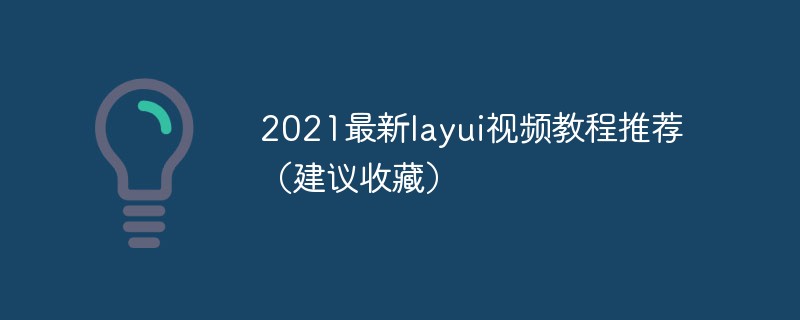 2023最新layui视频教程推荐(建议收藏)Jul 19, 2021 pm 05:22 PM
2023最新layui视频教程推荐(建议收藏)Jul 19, 2021 pm 05:22 PM以下为大家整理了前端UI框架 — layui的视频教程,不需要从迅雷、百度云之类的第三方网盘平台下载,全部在线免费观看。教程由浅入深,有前端基础的人就能学习,从安装到案例讲解,全面详细,帮助你更快更好的掌握layui框架!
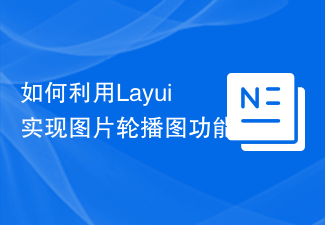 如何利用Layui实现图片轮播图功能Oct 24, 2023 am 08:27 AM
如何利用Layui实现图片轮播图功能Oct 24, 2023 am 08:27 AM如何利用Layui实现图片轮播图功能现如今,图片轮播图已经成为了网页设计中常见的元素之一。它可以使网页更加生动活泼,吸引用户的眼球,提升用户体验。在本文中,我们将介绍如何利用Layui框架来实现一个简单的图片轮播图功能。首先,我们需要在HTML页面中引入Layui的核心文件和样式文件:<linkrel="stylesheet"h
 如何利用Layui实现图片拖拽和缩放效果Oct 24, 2023 am 09:16 AM
如何利用Layui实现图片拖拽和缩放效果Oct 24, 2023 am 09:16 AM如何利用Layui实现图片拖拽和缩放效果在现代网页设计中,图片的交互效果成为增加网页活力和用户体验的重要手段。其中,图片拖拽和缩放效果是常见且受欢迎的交互方式之一。本文将介绍如何使用Layui框架实现图片拖拽和缩放效果,并提供具体的代码示例。一、引入Layui框架和相关依赖:首先,我们需要在HTML文件中引入Layui框架和相关依赖。可以通过以下代码示例引入
 如何利用Layui开发一个具有分页功能的数据展示页面Oct 24, 2023 pm 01:10 PM
如何利用Layui开发一个具有分页功能的数据展示页面Oct 24, 2023 pm 01:10 PM如何利用Layui开发一个具有分页功能的数据展示页面Layui是一个轻量级的前端UI框架,提供了简洁美观的界面组件和丰富的交互体验。在开发中,我们经常会遇到需要展示大量数据并进行分页的情况。以下是一个利用Layui开发的具有分页功能的数据展示页面的示例。首先,我们需要引入Layui的相关文件和依赖。在html页面的<head>标签中加入以下代
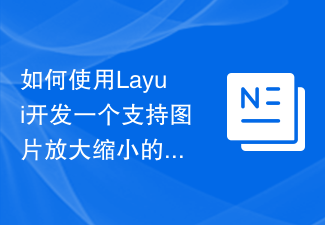 如何使用Layui开发一个支持图片放大缩小的相册功能Oct 24, 2023 am 09:02 AM
如何使用Layui开发一个支持图片放大缩小的相册功能Oct 24, 2023 am 09:02 AM如何使用Layui开发一个支持图片放大缩小的相册功能相册功能在现代的网页应用中非常常见,通过展示用户上传的图片,让用户能够方便地浏览和管理图片。为了提供更好的用户体验,一种常见的需求是支持图片的放大和缩小功能。本文章将介绍如何使用Layui框架开发一个支持图片放大缩小的相册功能,同时提供具体的代码示例。首先,确保您已经引入Layui框架的CSS和JS文件。您
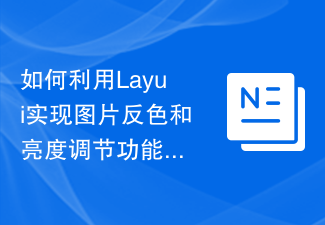 如何利用Layui实现图片反色和亮度调节功能Oct 25, 2023 am 09:10 AM
如何利用Layui实现图片反色和亮度调节功能Oct 25, 2023 am 09:10 AM如何利用Layui实现图片反色和亮度调节功能引言:在前端开发中,经常会遇到需要对图片进行特效处理的情况。本文将介绍如何利用Layui框架实现图片反色和亮度调节功能,并提供具体代码实例供参考。一、Layui简介:Layui是一款优秀的前端UI框架,具有简洁、美观、易用等特点。它提供了丰富的前端组件,让开发者能够轻松搭建出精美的网站。二、准备工作:在开始之前,我
 如何使用Layui开发一个支持文件上传和下载的资源管理系统Oct 24, 2023 am 09:19 AM
如何使用Layui开发一个支持文件上传和下载的资源管理系统Oct 24, 2023 am 09:19 AM如何使用Layui开发一个支持文件上传和下载的资源管理系统引言:随着互联网的发展,数据资源的管理已经成为一项重要的任务。无论是企业内部的文档管理,还是个人的文件存储,都需要一个高效且易于使用的资源管理系统。Layui是一款轻量级的前端框架,具有简洁明了的设计以及丰富的组件库,非常适合用来进行资源管理系统的开发。本文将介绍如何使用Layui开发一个支持文
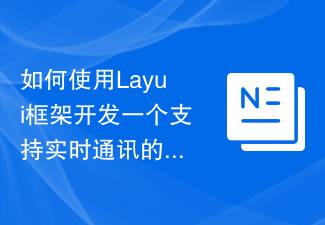 如何使用Layui框架开发一个支持实时通讯的在线客服系统Oct 25, 2023 am 08:47 AM
如何使用Layui框架开发一个支持实时通讯的在线客服系统Oct 25, 2023 am 08:47 AM如何使用Layui框架开发一个支持实时通讯的在线客服系统概述:在线客服系统是现代企业提供与客户交流的重要渠道之一,而实时通讯是在线客服系统的关键技术之一。本文将介绍如何使用Layui框架开发一个支持实时通讯的在线客服系统,并提供具体的代码示例。一、准备工作安装Node.js:在开发环境中安装Node.js,并配置好相关环境。安装Layui:在项目中引入Lay


Hot AI Tools

Undresser.AI Undress
AI-powered app for creating realistic nude photos

AI Clothes Remover
Online AI tool for removing clothes from photos.

Undress AI Tool
Undress images for free

Clothoff.io
AI clothes remover

AI Hentai Generator
Generate AI Hentai for free.

Hot Article

Hot Tools

Dreamweaver CS6
Visual web development tools

ZendStudio 13.5.1 Mac
Powerful PHP integrated development environment

Atom editor mac version download
The most popular open source editor

SublimeText3 Mac version
God-level code editing software (SublimeText3)

Safe Exam Browser
Safe Exam Browser is a secure browser environment for taking online exams securely. This software turns any computer into a secure workstation. It controls access to any utility and prevents students from using unauthorized resources.






